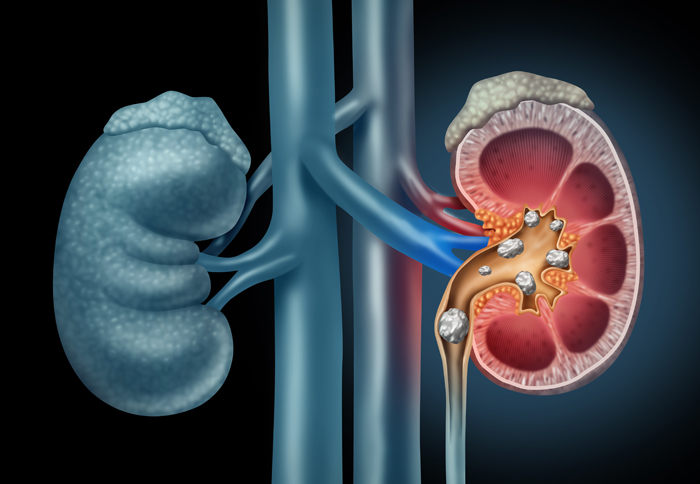Kidney Stones Treatment in MRC Nagar, Chennai
Kidney stones (renal calculi/nephrolithiasis) are defined as solid masses or crystals that are primarily formed in the kidneys, but they could also originate in other organs of the urinary tract, such as the ureter, bladder or urethra. They are made of crystalline substances such as minerals and salts that are mixed with the fluids that we consume. They coagulate to form bigger crystals and tend to cause pain and blockage.

What are the types of kidney stones?
The types of kidney stones are defined by the kind of material that the crystal/stone is composed of. Some of the types of kidney stones are:
- Calcium - As the most common type of kidney stones, they are caused by consumption of foods that contain high amounts of calcium oxalate.
- Uric acid - It is likely to occur in those who are suffering from gout or undergoing chemotherapy.
- Struvite - Made of ammonium magnesium phosphate, this type is more common among women who suffer from UTIs
- Cystine - Found in those who suffer from a genetic disorder called cystinuria.
What are the symptoms of kidney stones?
The first and foremost symptom is severe pain called renal colic. Some of the other common symptoms of kidney stones are:
- Hematuria
- Urinary incontinence
- Frequent urination
- Vomiting
- Chills
- Fever
- Nausea
- Foul-smelling urine
- Discolored urine
- Pain in the back or abdomen
- Pain that radiates to the lower abdomen or groin
- Burning sensation while urinating
As the stone moves within the kidneys to other urinary organs, the intensity of the pain might fluctuate. If you experience any of these symptoms, you should immediately consult a nephrologist, urologist or a specialist doctor.
Request an appointment at Apollo Spectra Hospitals, MRC Nagar, Chennai.
Call 1860 500 2244 to book an appointment.
What are the causes of kidney stones?
Although the exact causes of kidney stones vary from person to person, some of the factors that lead to kidney stones include:
- Dehydration
- Mineral salts such as calcium, struvite, oxalate, uric acid, etc.
- Genetic factors such as family history
- Obesity
- Digestive disorders
- Digestive surgical procedures
- Diets
- Supplements
- Medications
- Renal tubular acidosis
- Cystinuria
- Hyperparathyroidism
- Urinary tract infections
What is the treatment for kidney stones?
Depending on the size, shape, location and type of kidney stones, various forms of treatment and remedies are recommended by a doctor. Some of these treatments are:
- Medication - Pain medication, antibiotics and NSAIDs may provide relief
- Lithotripsy - Shock waves are used to break down kidney stones into smaller crystals that can pass through the ureter without inflicting pain
- Percutaneous Nephrolithotomy - Tunnel surgery is performed by removing kidney stones with a small incision
- Ureteroscopy - A small tube attached to a camera is inserted into the urethra and the bladder to remove kidney stones
Beyond these medical treatment procedures, home remedies can act as preventive measures. Drinking sufficient water, fluids, fruit juices and other natural remedies act as the primary prevention methodology for preventing kidney stones. Reducing alcohol intake, dehydration, and other ailments can also be helpful.
Conclusion
Even though kidney stones are common, they can be treated and prevented easily. Despite being a troublesome and painful disorder, kidney stones can be treated by early diagnosis, medical consultation from a nephrologist or a urologist and timely intervention.
If the stones are small in size, medication and drinking sufficient fluids can help them pass through the urine. If a stone is big, even a few mm in diameter, other medical techniques such as surgery might be required.
The doctor may recommend bed rest for 1-2 days. Within 3 days, the patient can walk freely but should avoid strenuous activities. Within a week of the surgery, most of the post-op pain subsides.
Yes. If the stone is lodged into the kidney, grows bigger in size, causes leak, blockage or incontinence, kidney failure may also occur.
Symptoms
Our Top Specialities
NOTICE BOARD
CONTACT US
CONTACT US
 Book Appointment
Book Appointment


.svg)
.svg)
.svg)
.svg)








